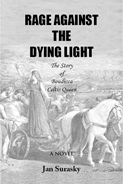 |
Rage Against the Dying Light by Jan Surasky Sandalwood Press
book review by Karolina Blaha-Black
"After their meals, they often have trials of valor, as we do. The bards and the vates celebrate the hero with wine and song."
The quote above relates the words of Diviticus, a Celtic Druid, to Boudicca, a young Celtic princess of the Coritani tribe, later to become the famous queen of the Iceni tribe who led the Celts against the Roman army. Boudicca was instrumental in amassing the oppressed Celtic tribes against the Romans, and even though she lost the battle in the end, she remains, as the author states, a symbol of human freedom.
Unlike other books about the famous warrior queen, this novel concentrates on Boudicca's younger years. As a child, Boudicca spent her days in company of her parents, learning the duties of her noble birth, riding horses upon the countryside, and idling her days by the Devon river with her friends of noble birth, and with Linnea, a farmers daughter. Later, we follow Boudicca as she gets joined in marriage with Prasutagus, chieftain of the Iceni tribe, and gives birth to her two daughters, Alaina and Valeda.
The second part of the novel takes on a darker tone, as the Romans yearn for more riches and power, and want to finish the subjugation of the Celts that Caesar didn't finish. Boudicca loses her husband to an illness, and the Romans storm her palace, raping her two daughters, humiliating Boudicca, and taking her relatives and servants as slaves to Rome.
In an act of retaliation, Boudicca convinces many other Celtic tribes to stand against the Romans as one along with her. For a long time, she is successful, but in the end, the well-trained Roman army wins, subjugating the remaining Celts. Boudicca, to avoid capture, ingests the poisonous mistletoe plant, sacred to the Celts, dying in the hands of Venutius, her childhood friend. Alaina and Valeda, her two daughters, are taken away to safety by Venutius, to spend their lives plowing the fields as farmers wives.
The book is written with a poetic flair, and reads smooth and warm despite the horrors inflicted upon the Celts by the Romans that the reader learns about. The author shows the reader a side of Boudicca that many books do not cover. We see her not just as a hero and a warrior, but also a friend, and a mother. She portrays the last stand against the encroaching might of Rome and the symbol of courage that has been hers alone in history books.
